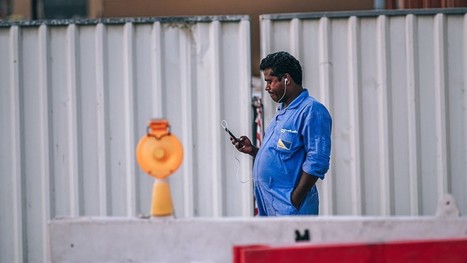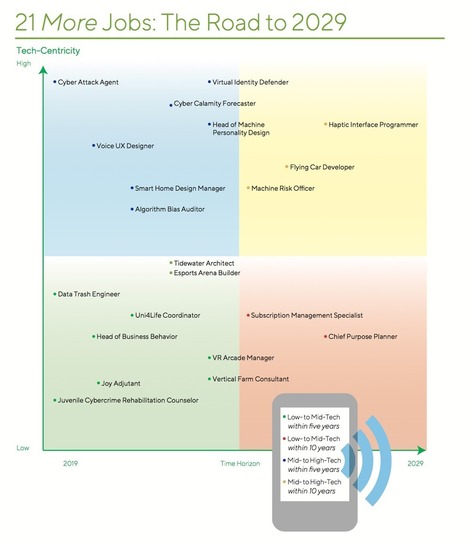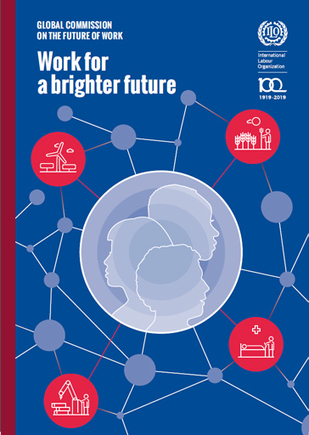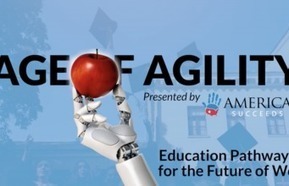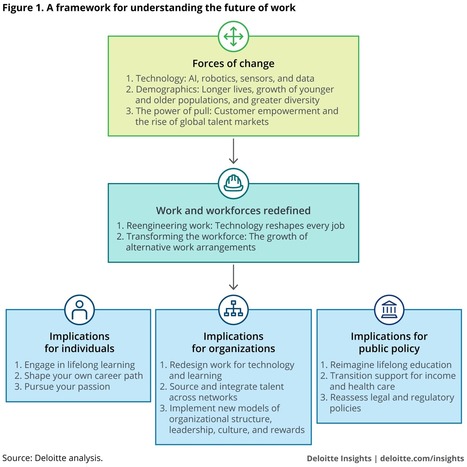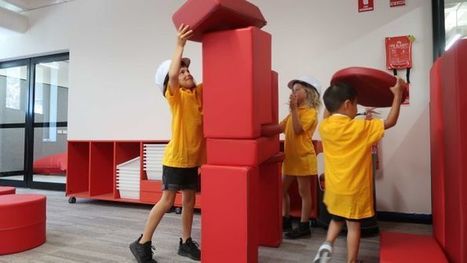The ability to think critically, on the other hand, has been associated with wellness and longevity. Though often confused with intelligence, critical thinking is not intelligence. Critical thinking is a collection of cognitive skills that allow us to think rationally in a goal-orientated fashion and a disposition to use those skills when appropriate. Critical thinkers are amiable skeptics. They are flexible thinkers who require evidence to support their beliefs and recognize fallacious attempts to persuade them. Critical thinking means overcoming all kinds of cognitive biases (for instance, hindsight bias or confirmation bias).
Get Started for FREE
Sign up with Facebook Sign up with X
I don't have a Facebook or a X account

| Tags |
|---|
 Your new post is loading... Your new post is loading...
 Your new post is loading... Your new post is loading...
Now a new report by the British innovation foundation Nesta and University of Oxford future-gazers from the Oxford Martin School tries to establish how those changes will affect skill requirements by 2030. First, the team behind the research identified occupations that look set to be automated away (such as shelf fillers, van drivers, and administrators) and those that are likely to grow in the face of technology’s encroachment (including teachers, biotech researchers, and nurses).
Kim Flintoff's insight:
"Now a new report by the British innovation foundation Nesta and University of Oxford future-gazers from the Oxford Martin School tries to establish how those changes will affect skill requirements by 2030. First, the team behind the research identified occupations that look set to be automated away (such as shelf fillers, van drivers, and administrators) and those that are likely to grow in the face of technology’s encroachment (including teachers, biotech researchers, and nurses). Then, they looked at the skills that were most common among the occupations that had the greatest prospect of growing in the future, to work out which would be most useful when the robots come. From the report, here are the top five desirable future work skills: Judgment and decision making; Fluency of ideas; Active learning; Learning strategies; Originality."
From
qz
While specialization may seem like a good thing—college students learning specific skills to match the exacting requirements of many of today’s jobs—researchers are worried that degrees focused only on certain types of work may in fact be detrimental to young workers.
Kim Flintoff's insight:
While specialization may seem like a good thing—college students learning specific skills to match the exacting requirements of many of today’s jobs—researchers are worried that degrees focused only on certain types of work may in fact be detrimental to young workers. “There is a real concern that these labor-market-oriented degrees that focus on specific technical skills are not as durable,” says Guy Berger, a LinkedIn economist and one of the researchers who worked on the report. Berger believes that ”cross-functional skills” like management and analytical know-how are more adaptable across a range of work environments. As technology changes the nature of work across nearly every industry, it’s important to have a wide range of such talents, rather than a narrow subset applied only to a particular sector that may not look the same in the near future (or, indeed, exist at all).
Most conversations about the “future of work” focus on how new technologies and ways of working — such as artificial intelligence and the gig economy — will dramatically reshape modern industries. But very few answer what the earth’s 7.4 billion humans should be doing now to prepare for an unpredictable future.
Kim Flintoff's insight:
We're working on new flexible stackable credentials focussed on life-long variety in learning...
"Most conversations about the “future of work” focus on how new technologies and ways of working — such as artificial intelligence and the gig economy — will dramatically reshape modern industries. But very few answer what the earth’s 7.4 billion humans should be doing now to prepare for an unpredictable future. As it turns out, the future of work conversation is inherently a future of education conversation. If the hallmark of 20th century learning was access to a college education, the 21st century will emphasize frameworks that support lifelong learning. Education is no longer a linear process with the endpoint of a single diploma, but a continuous and fluid process that should help us adapt to changing technological, economic, and social conditions."
Higher education IT association Educause recently released a preview of its 2019 Horizon Report, an analysis of the trends and technology developments that are likely to impact higher ed in the short-, mid- and long-term future. The preview, which provides a summary of the issues covered in upcoming report along with some brief commentary, was unveiled last week during the final general session of the 2019 Educause Learning Initiative Annual Meeting.
Kim Flintoff's insight:
The Learning Futures Network and Innovative Schools Consortium is already making headway on several of the trends: 1-2 years + Redesigning learning spaces - + Blending Learning designs 3-5 years: + Advancing Cultures of Innovation - This is the essence of the LFN/ISC + Growing focus on measuring learning - finding new methods and strategies to determine learning and learner development. 5+ years + Rethinking how institutions work - redefining the relationships between university and other sectors; + Modularized and disaggregated degrees - creating new stackable and stored value credentials
The future of work is at the heart of every major socio-economic-political debate raging around the world today. Building walls across borders; migrants landing on the beaches of southern Europe; surveillance policies in Xinjiang; hard or soft Brexit; taxi services in Paris; and the concentration of wealth among the 1% are all considerations that reveal the nature and distribution of work.
Kim Flintoff's insight:
I read these two opening paragraphs and shudder - while this may be the reading of the historical development of the world economy - I wonder why we can't create a new future that is predicated on a different conception of a positive economy... I'm especially concerned that the use of the power metaphor is still seen as valid despite Gregory Bateson's 50 year-old warning that the metaphor of power is essentially pathological.
"The future of work is at the heart of every major socio-economic-political debate raging around the world today. Building walls across borders; migrants landing on the beaches of southern Europe; surveillance policies in Xinjiang; hard or soft Brexit; taxi services in Paris; and the concentration of wealth among the 1% are all considerations that reveal the nature and distribution of work. Power comes from work, and from the money it generates. From the absence of work stems powerlessness. This is particularly salient in 2019, as people understand that work is changing more quickly than ever before. The arguments are so fierce because the stakes are so high." We still seem incapable of properly engaging with cybernetics and systems thinking... we ascribe fixity to dynamic systems, to actions and processes, and yet, a fundamental severing of a connection in a network will build strength in another, perhaps less evident, connection elsewhere in the network... What historical associations, connections and attachments should we sever to allow the development of a stronger set of new connections, more relevant to our our vision of the future?
From
www
For the first time ever, today’s workforce includes four generations working together: traditionalists, boomers, Gen X and millennials. As technology invades our lives, both at work and at home, employees are focused more on work-life integration over balance.
Kim Flintoff's insight:
Our work was most integrated in our life when we were closely connected to the production of our food, our clothing and our shelter - as each of these was moved to further and further degrees of separation our lives became more and more abstract... what is there instead of work-life balance, or work-life integration??
"For the first time ever, today’s workforce includes four generations working together: traditionalists, boomers, Gen X and millennials. As technology invades our lives, both at work and at home, employees are focused more on work-life integration over balance."
Leaders operate their businesses within an increasingly complex context of VUCA (volatility, uncertainty, complexity and ambiguity). They must navigate resource scarcity, economic polarity, the speed of technological advancement, environmental breakdown, human disconnection and changes in what’s valued as a life well lived. Seventy-five percent of us expect brands to make more of a contribution to our well-being, yet only 40 percent think brands are doing so. On the talent attraction and retention side, research shows that employees want to work for purposeful companies, where their own values align with those of the company.
Kim Flintoff's insight:
"Leaders operate their businesses within an increasingly complex context of VUCA (volatility, uncertainty, complexity and ambiguity). They must navigate resource scarcity, economic polarity, the speed of technological advancement, environmental breakdown, human disconnection and changes in what’s valued as a life well lived."
As technology renders jobs obsolete, what will keep us busy? Sapiens author Yuval Noah Harari examines ‘the useless class’ and a new quest for purpose
Kim Flintoff's insight:
Do any of our plans include a "post-work" economy? Why must all our educational efforts be focussed on the creation of work? What are the alternatives? Why not a future of "meaning", or a future of "being"? Given so may people eschew the reality of their "jobs" why do we focus so much time and energy on creating more?
For decades, people have forecast with trepidation the run-up to 2030 as a challenging time for human life on the planet.
Kim Flintoff's insight:
For decades, people have forecast with trepidation the run-up to 2030 as a challenging time for human life on the planet. Limits to Growth projected a civilisational collapse in 2030. 1http://www.donellameadows.org/wp-content/userfiles/Limits-to-Growth-digital-scan-version.pdf John Beddington, former Chief Scientific Advisor to the UK government, famously named 2030 crunch time for a ‘perfect storm’ of resource and climate crises. The IPCC recently warned that we have 12 years to avert catastrophic climate change, and the consensus is that we’re already locked into 1.5°C of warming﹣not climate change but climate breakdown. We are now almost in the 2020s, on the cusp of a decade that threatens great uncertainty, volatility and suffering. The window of opportunity to create a sustainable world, one in which people everywhere can lead fulfilling lives on a healthy planet, seems narrower than ever before. But there are always multiple futures open to us. At Forum for the Future we believe that a positive future is still possible if people in positions of power everywhere step up their level of ambition, and skill up on how to work systemically. To help us to do that though, we need to understand how the world is changing, what the implications are and how that translates into action needed today. Can we change the story of the 2020s before it transforms us?
He was quite blunt about the error of conventional curriculum: “it is clear that a statement of objectives in terms of content headings…is not a satisfactory basis for guiding the further development of the curriculum.” The critique resulted from a premise about the aim of education (since curriculum is the formal path by which we achieve our educational aims). What is the aim of any curriculum? According to Tyler, the general aim is “to bring about significant changes in students’ patterns of behavior.” In other words, though we often lose sight of this basic fact, the point of learning is not just to know things but to be a different person – more mature, more wise, more self-disciplined, more effective, and more productive in the broadest sense. Knowledge is an indicator of educational success, not the aim. Thus, the conventional view of curriculum and the process of conventional curriculum writing must be wrong:
Kim Flintoff's insight:
He was quite blunt about the error of conventional curriculum: “it is clear that a statement of objectives in terms of content headings…is not a satisfactory basis for guiding the further development of the curriculum.” The critique resulted from a premise about the aim of education (since curriculum is the formal path by which we achieve our educational aims). What is the aim of any curriculum? According to Tyler, the general aim is “to bring about significant changes in students’ patterns of behavior.” In other words, though we often lose sight of this basic fact, the point of learning is not just to know things but to be a different person – more mature, more wise, more self-disciplined, more effective, and more productive in the broadest sense. Knowledge is an indicator of educational success, not the aim. Thus, the conventional view of curriculum and the process of conventional curriculum writing must be wrong: “The purpose of a statement of objectives is to indicate the kinds of changes in the student to be brought about so that the instructional activities can be planned and developed in a way likely to attain these objectives; that is to bring about these changes in students. Hence it is clear that a statement of objectives in terms of content headings…is not a satisfactory basis for guiding the further development of the curriculum. The most useful form for stating objectives is to express them in terms which identify both the kind of behavior to be developed in the student and the … area of life which this behavior is to operate.” pp. 45-7.
This landmark report by the ILO Global Commission on the Future of Work examines how to achieve a better future of work for all at a time of unprecedented change and exceptional challenges in the world of work.
Kim Flintoff's insight:
"This landmark report by the ILO Global Commission on the Future of Work examines how to achieve a better future of work for all at a time of unprecedented change and exceptional challenges in the world of work."
The future of work will bring new challenges and cause us to shift how we think about jobs and employability—so what does this mean for teaching and learning? In our exploration of the #FutureOfWork, sponsored by eduInnovation and powered by Getting Smart, we dive into what’s happening, what’s coming and how schools might prepare.
Kim Flintoff's insight:
"The future of work will bring new challenges and cause us to shift how we think about jobs and employability—so what does this mean for teaching and learning? In our exploration of the #FutureOfWork, sponsored by eduInnovation and powered by Getting Smart, we dive into what’s happening, what’s coming and how schools might prepare. We are interested in helping communities engage deeply in shaping learning opportunities for students, helping education systems shift their graduate profiles to prepare for the future, and shifting the national conversation around the future of work."
|
Some of the skills hiring managers find lacking or absent are unexpected. Critical thinking, problem solving, attention to detail, and writing proficiency top the list of skills managers find missing from job seekers’ personal tool kits. On the flip side, managers didn’t find graduates wanting for know-how in search engine optimization marketing, foreign languages, and coding.
Kim Flintoff's insight:
Some of the skills hiring managers find lacking or absent are unexpected. Critical thinking, problem solving, attention to detail, and writing proficiency top the list of skills managers find missing from job seekers’ personal tool kits. On the flip side, managers didn’t find graduates wanting for know-how in search engine optimization marketing, foreign languages, and coding.
Saadia Zahidi, Head of Education, Gender and Work System Initiative, Member of Executive Committee, World Economic Forum Geneva Currently, the world has developed only 62% of its human capital as…
Kim Flintoff's insight:
This is one aspect of the Learning Futures Network tat is starting to emerge - out non-school members are also invested in ongoing learning and social responsibility:
"Business must re-think its role as a consumer of “ready-made” human capital. A number of leading global companies understand this imperative and are already investing in the continuous learning, re-skilling and up-skilling of their employees; but too many companies are still looking at people as a cost to be minimized. In the short term, this might seem efficient or might pay off for specific companies, but in the long term, it will reduce innovation and reduce social cohesion. Companies must begin to think of re-skilling and up-skilling their workforces as an investment and a social responsibility. Deepening the conversation between educators and businesses will be key to ensuring that training across educational institutions provides the skills economies need, the talent needs of businesses, and constitutes a worthwhile investment for individuals themselves."
The emerging jobs of today, tomorrow, and the future we cannot foresee will require the skills and capabilities that make us most human. Take the common assumption about the kinds of skills that are least likely to be automated: Most believe that higher-order skills, requiring complex intellectual processing and extensive training, are least likely to be automated. To demonstrate the weakness in this assumption, let us consider two highly different jobs: Expert Radiologist and Construction Worker.
Kim Flintoff's insight:
The more rule-bound and logical your work, the more susceptible it is to the influence of machine learning, AI and automation. "The emerging jobs of today, tomorrow, and the future we cannot foresee will require the skills and capabilities that make us most human. Take the common assumption about the kinds of skills that are least likely to be automated: Most believe that higher-order skills, requiring complex intellectual processing and extensive training, are least likely to be automated. To demonstrate the weakness in this assumption, let us consider two highly different jobs: Expert Radiologist and Construction Worker."
It is within our power to reshape our present order of work in a way that does not insist that the next generation must choose between work that renews the world and work that is materially secure. We can, instead, fashion a system that offers them a stake in a deep and expansive environmental politics. One that isn’t just about what they do or don’t buy, but that yokes together their private lines of progress with that other great line that determines and marks our collective fate. Such a system would not only be easier and fairer to live in. It would also enable their ambitions, their loves and their impulses to care for the places and people around them to be woven into a common social project they will fight for when we are all gone: the nurturance of life, and the flourishing of our common home.
Kim Flintoff's insight:
A future of work not often considered:
"It is within our power to reshape our present order of work in a way that does not insist that the next generation must choose between work that renews the world and work that is materially secure. We can, instead, fashion a system that offers them a stake in a deep and expansive environmental politics. One that isn’t just about what they do or don’t buy, but that yokes together their private lines of progress with that other great line that determines and marks our collective fate. Such a system would not only be easier and fairer to live in. It would also enable their ambitions, their loves and their impulses to care for the places and people around them to be woven into a common social project they will fight for when we are all gone: the nurturance of life, and the flourishing of our common home."
How to avoid a world of technology-driven haves and have-nots as the digital transformation is effected. Karen Chester suggests a range of practical measures to get us there.
Kim Flintoff's insight:
"How to avoid a world of technology-driven haves and have-nots as the digital transformation is effected. Karen Chester suggests a range of practical measures to get us there."
Two powerful forces are shaping our workforces and workplaces: the growing adoption of artificial intelligence in the workplace and the expansion of the workforce to include both on- and off-balance-sheet talent. What does the future of work look like, and what are the implications for individuals, organizational leaders, and public institutions?
Kim Flintoff's insight:
While the discussion on the forces of change continues - do we seem to be still focussed on the same targets? Are these targets relevant for our future? What new questions need to be asked to shape a vision of a more relevant future?
Nearly every discussion of labor’s future in mainstream media quickly becomes mired in a group of elite-defined concerns called “The Future of Work.” Rarely has a phrase been so ubiquitous in discussions of the economy or social policy. Plug it into a search engine and you’ll generate 50 million hits. Scarcely a week goes by without a new convening, report, or foundation initiative focused on the Future of Work that details hair-raising scenarios about the potential disappearance of jobs before sweeping waves of robotization, artificial intelligence, and machine learning.
Kim Flintoff's insight:
Are we asking the right questions about the future?
Machines will one day be able to carry out all tasks currently performed by humans. We asked the economist Gilles Saint-Paul to describe six possible futures for the 22nd century.
Kim Flintoff's insight:
Machines will one day be able to carry out all tasks currently performed by humans. We asked the economist Gilles Saint-Paul to describe six possible futures for the 22nd century.
For decades, people have forecast with trepidation the run-up to 2030 as a challenging time for human life on the planet.
Kim Flintoff's insight:
For decades, people have forecast with trepidation the run-up to 2030 as a challenging time for human life on the planet. Limits to Growth projected a civilisational collapse in 2030. 1http://www.donellameadows.org/wp-content/userfiles/Limits-to-Growth-digital-scan-version.pdf John Beddington, former Chief Scientific Advisor to the UK government, famously named 2030 crunch time for a ‘perfect storm’ of resource and climate crises. The IPCC recently warned that we have 12 years to avert catastrophic climate change, and the consensus is that we’re already locked into 1.5°C of warming﹣not climate change but climate breakdown. We are now almost in the 2020s, on the cusp of a decade that threatens great uncertainty, volatility and suffering. The window of opportunity to create a sustainable world, one in which people everywhere can lead fulfilling lives on a healthy planet, seems narrower than ever before. But there are always multiple futures open to us. At Forum for the Future we believe that a positive future is still possible if people in positions of power everywhere step up their level of ambition, and skill up on how to work systemically. To help us to do that though, we need to understand how the world is changing, what the implications are and how that translates into action needed today. Can we change the story of the 2020s before it transforms us?
"Would you steer a Year 6, 7 or 8 student away from ‘soft’ subjects like art and music to harder ones like maths and English? Intuitively, it seems that fluffier-seeming subjects allow for fun and creativity alone. A new study, however, shows that creative arts subjects like theatre and dance improve numeracy and literacy scores.
Kim Flintoff's insight:
"Would you steer a Year 6, 7 or 8 student away from ‘soft’ subjects like art and music to harder ones like maths and English? Intuitively, it seems that fluffier-seeming subjects allow for fun and creativity alone. A new study, however, shows that creative arts subjects like theatre and dance improve numeracy and literacy scores. Researchers from George Mason University in Virginia, the US, followed over 10,000 mostly low-income Florida students from Kindergarten to Year 8. After controlling for all other variables, they discovered that those who undertook creative arts subjects in middle school – Years 6 to 8 – “…went on to earn significantly higher GPAs and higher standardized math and reading scores, and were less likely to get suspended from school, compared to students who were not exposed to arts classes.” These students also “showed stronger social, behavioral, language, motor, and cognitive skills seven years earlier in preschool,” which appears to suggest that more capable students tend to choose arts electives. Yet the arts-high grades link was established even when the researchers controlled for these skills."
Many of us tend to view the future of education through rose-colored glasses, daydreaming of a Utopian society where all of the education challenges and inequities of the past have been neutralized. I am not saying that the future won’t be beneficial to the field of education, I am just saying that it will not be a panacea. In fact, if we are not careful, the challenges that we presently face in education may become exacerbated in the future or lead to a whole new set of problems. Let’s look at 3 tech challenges that stand to undermine the future of education.
Kim Flintoff's insight:
“Many of us tend to view the future of education through rose-colored glasses, daydreaming of a Utopian society where all of the education challenges and inequities of the past have been neutralized. I am not saying that the future won’t be beneficial to the field of education, I am just saying that it will not be a panacea. In fact, if we are not careful, the challenges that we presently face in education may become exacerbated in the future or lead to a whole new set of problems. Let’s look at 3 tech challenges that stand to undermine the future of education.”
It is a public school with no classrooms, school bells, year levels or exams — as we know them.
Kim Flintoff's insight:
It is a public school with no classrooms, school bells, year levels or exams — as we know them. Opening next week in Sydney, Lindfield Learning Village promises to break the mould and "change the measures of success", according to its principal. "The education system we currently have in place was developed over 100 years ago to produce factory workers, and obviously that's not what we need to be producing in this era," said principal Stephanie McConnell, one of the architects of the new education model. Ms McConnell gave 7.30 an exclusive first look inside the new school, which will open its doors to students from kindergarten to year 10 next week. Eventually it will host students up to year 12.
|





